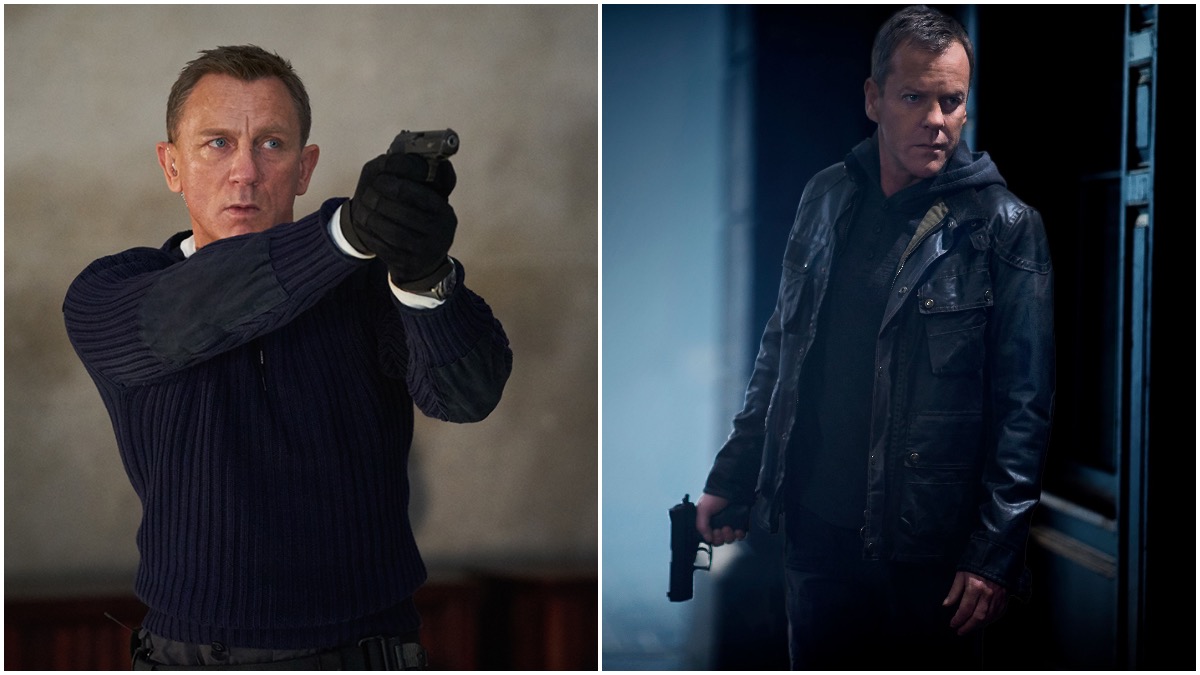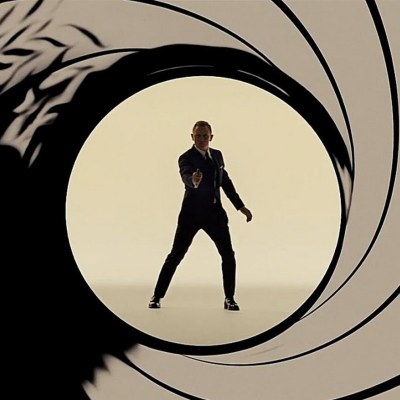Despite what Marvel might have you believe, not all film franchises are perfectly serialized.
Take, for example, another kind of cinematic superhero: James Bond a.k.a. 007. The MI6 spy created by Ian Fleming and brought to screen by Harry Saltzman and Albert R. Broccoli is timeless in the most literal sense of the world. Since Sean Connery passed the role of James Bond to Roger Moore for good in 1973’s Live and Let Die (Connery previously gave way to George Lazenby in On Her Majesty’s Secret Service before returning in Diamonds Are Forever), James Bond has become unstuck in time.
As played in subsequent films over several decades by actors like Timothy Dalton, Pierce Brosnan, and Daniel Craig, Bond remains the same while the world around him changes. Some fans like to theorize that “Agent 007” and “James Bond” are aliases used by different MI6 spies throughout the years. But within the context of the series, there is only one Bond…James Bond. Bond is always middle-aged, looks good in a tux, enjoys stiff drinks and beautiful women.
Read more
The Cold War ended in the ‘90s and yet Bond, perhap the ultimate cinematic representative of its aesthetic, just kept calm and carried on as usual. Save for a handful of Craig’s latter year depictions, James Bond rarely learns any new tricks. He doesn’t develop. He is what he is – a hero of espionage and action. In that regard, the James Bond series is a surprisingly honest exploration of the occasional propagandistic aims of major blockbuster filmmaking. Bond isn’t a character in a story. He’s the United Kingdom’s idealized version of itself writ large on a canvas widescreen: a suave spy who is welcomed into every country to get laid and save the world.
But what about the United States’ idealized version of itself? How has the Cold War’s lone surviving superpower let itself go without a similarly iconic (and occasionally nakedly jingoistic) cinematic creation? The answer is that America already does have an outsized action icon…he was just on television.
Jack Bauer of early 2000s Fox thriller series 24 is American James Bond whether we want him to be or not. Just as Bond is the idealized Englishman, with his martini lunches and quick wit, Bauer is the America’s warped ideal of itself: angry, merciless, focused, and unfailingly effective.
As portrayed by Kiefer Sutherland (who won an Emmy for the role), Jack Bauer started off as a fairly three-dimensional character in 24’s first season. That season picked up with Jack as a family man and a glorified pencil pusher at the fictional Counter Terrorist Unit’s Los Angeles office. Over the span of the first season’s 24 hours (24’s hook, of course, is that each season takes place over the span of a 24-hour day in real time), Jack slowly lost grip of his humanity, culminating with his friend Nina Myers turning out to be a mole and murdering his wife Teri.
The death of Teri fundamentally changed Jack. For eight subsequent seasons and a movie, Jack became an Uncle Sam-style cartoon character obsessed with protecting his country from terrorists all over the globe, because his family was already taken away from him. Elisha Cuthbert as Jack’s daughter Kim was a prominent character for a few seasons, but as she was phased out so too was Jack’s grip on reality.
Unlike the James Bond series, 24 was particularly devoted to its chronology, with the very premise of the show meaning it had to have a close relationship with time. Jack Bauer would in theory grow as a character from season to season. But rather than developing, he mostly devolved into the most base version of himself.
It’s in this way that Bauer actually became more like James Bond than one might initially expect. Regardless of who is playing him or what time period a particular film is set in, Bond’s characteristics remain static. By the end of 24’s run in 2014, Jack was similarly a Bond-ian relic of the past. Though the country was still feeling the effects of it, “The War on Terror” seemed as dramatically quaint for 24 as the Cold War did for James Bond. And yet here was this rugged American in the miniseries 24: Live Another Day, gripping the life out of a pistol and barking at perceived London terrorists in a gravely timber like a psycho.
24: Live Another Day was the last appearance for Jack Bauer and rightfully so at the time. The character had become a bit too anachronistic and his show, quite frankly, was frequently xenophobic. Still, as the continued success of Craig’s Bond films indicate (with No Time to Die finally set to arrive this October) perhaps there is still room for walking anachronisms in the entertainment world, as long as they’re approached correctly.
Fox has repeatedly attempted to rejuvenate the 24 brand. In 2017, the network greenlit a spinoff starring Corey Hawkins called 24: Legacy. Like its forefather, 24: Legacy, utilized a real-time format, only condensing 24 hours into 12 episodes like Live Another Day did. The spinoff was not successful and was quickly canceled following the conclusion of its first season.
Ultimately, Fox (now owned by Disney) hasn’t made any subsequent reboot attempts work yet because it has misidentified the appeal of 24 as a franchise. While the ticking clock aspect of telling a story in real time is novel and interesting, it wasn’t the reason the original series lasted for nine seasons. The real reason for 24’s success was Jack Bauer. Viewers are typically attracted to characters, not concepts. In Jack Bauer, many an American viewer likely found the embodiment of a paranoid nation they recognized.
There’s an undercurrent of anger and indignance in the American psyche. Exactly why is a question best left for sociologists. Perhaps it’s misplaced guilt over displacing a society to create a new one, or maybe it’s just the disappointment of being promised a Manifest Destiny and getting Wyoming. But whatever the reason, Jack Bauer is as apt a cartoonish American avatar as James Bond is a British one.
So why then doesn’t 20th Television (again, now owned by Disney) just formalize the comparison and make Jack Bauer literally American James Bond? Just as Connery once handed off the baton to Lazenby and Moore, have Sutherland hand the role off to someone else. That actor would preferably represent the American physicality that Sutherland brought to the role (despite Sutherland being a Canadian, which is somewhat fitting given that the Scottish Connery was the first to play Her Majesty’s favorite spy). The new Jack Bauer would be played by someone who is short, stubbly, and angry rather than Bond’s tall, dark, and handsome. Throw the new Jack back into the field in a modern day ticking time bomb plot without bothering to explain why he is still middle-aged after 20 years.
The answer to why Disney wouldn’t want to do such a thing is almost certainly all that aforementioned racism and torture. That is admittedly a, uh…roadblock. It really can’t be overstated just how xenophoci 24 was at times and how cruel it could be to characters and actors of Middle Eastern descent. Jack Bauer’s reliance on torture wasn’t just a dramatic crutch, 24 co-creator Joel Surnow genuinely believed in the value of torture as a foreign policy tactic.
Suffice it to say, the series has not aged well. Then again, however, neither have many of the earlier Bond films. To a certain extent that’s the point of the Bond franchise. It understands that making movies is making myths. James Bond is every bit the mythical figure that Captain America or Iron Man are. The fact that Bond is so obviously an exaggerated character now has helped soften some of his more problematic edges.
Bauer, on the other hand, comes from an era where Americans were both terrified of the looming threat of terrorism and were starting to invest in television as a more “serious” art form. As such, not everyone of the time was prepared to accept Jack Bauer as American James Bond, that is to say a cheesy cultural figure, not a vital supersoldier of freedom.
In The Atlantic’s 2007 article “Whatever It Takes” about the politics of 24, U.S. Army Brigadier General Patrick Finnegan, the dean of the United States Military Academy at West Point, recounts Jack Bauer’s effect on enlistees.
“The kids see it, and say, ‘If torture is wrong, what about 24?’ The disturbing thing is that although torture may cause Jack Bauer some angst, it is always the patriotic thing to do.”
The world has changed since then, obviously. But even now, it feels like it hasn’t fully set in that Jack Bauer is the American James Bond and should be treated with the same amount of reverence, which is none at all. Perhaps the only responsible move left is, in fact, to continue the increasingly ridiculous stories of the character with new actors.
In the right hands, Jack Bauer could be put to use as a blockbuster magnet and an appropriate critique of American foreign policy. In the end, icons don’t matter so much as what you do with them.

